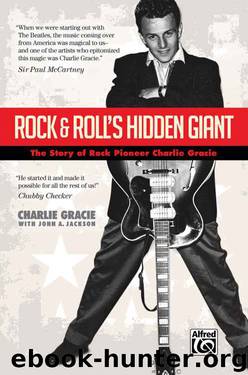Rock & Roll's Hidden Giant: The Story of Rock Pioneer Charlie Gracie by Charlie Gracie & John A. Jackson

Author:Charlie Gracie & John A. Jackson [Gracie, Charlie]
Language: eng
Format: epub
Publisher: Alfred Publishing
Published: 2014-09-21T21:00:00+00:00
(double-tap to enlarge)
(double-tap to enlarge)
(double-tap to enlarge)
(double-tap to enlarge)
(double-tap to enlarge)
(double-tap to enlarge)
(double-tap to enlarge)
(double-tap to enlarge)
(double-tap to enlarge)
(double-tap to enlarge)
(double-tap to enlarge)
(double-tap to enlarge)
11
Estrangement
As Charlie Gracie’s career hit a wall, the inconspicuous alliance between Bernie Lowe and Dick Clark continued to benefit both parties. In 1958, with Cameo Records now a successful company possessing a bright future, Bernie Lowe made two significant business decisions. First he formed a new record company called Parkway Records. Then he bought out several minority investors in Cameo and merged the two companies to form Cameo-Parkway Records.
But in November 1959, the staunch affiliation of Bernie Lowe and Dick Clark fractured. Due mainly to the large number of independent record companies located in Philadelphia by the early 1950s, that city had acquired a reputation within the pop music industry as a wide-open town for disc jockey payola. With the concurrent rise of rock and roll and American Bandstand, Philadelphia continued to lead the way in payola notoriety.49
Although rumors of payola continued to abound, no proof of any of the allegations had as yet come to light. But as the federal government’s formal investigation into bribery in the pop music business began in November 1959, the nefarious practice’s web of secrecy and innuendo began to unravel. In one particular instance, Edward D. Cohn, the owner of leading Philadelphia record distributor Lesco Distributors, revealed to federal investigators for the House of Representatives how it cost him thousands of dollars to get his records played on local radio stations. “This city has a reputation of being the worst place in the country for payola,” he declared.50
Among the considerable occurrences of payola in Philadelphia that began to surface was the fact that Bernard Lowe Enterprises, since its inception in 1956, had made promotional payments to disc jockeys, and Chips Distributing (of whom Lowe and Dick Clark were “silent” partners) had made similar payments.51
v
As 1958 drew to a close I gained a new record company and a whole lot more. On December 12, my son Charlie, Jr. was born. (In case you’re wondering, he was named after my grandfather, not me.) You might think the addition of another mouth to feed put added burden on me as the sole support of my extended family, but I’d never felt that kind of pressure before my son was born and I didn’t feel any after he arrived.
At that point in my career I still thought I was on top of the world. My ongoing work in the clubs kept me well known in the business, and I was still able to pull in more than $1,000 a week. I put that money into the bank and took it out only as it was needed. What’s more, I’d finally negotiated my freedom from Cameo Records and had recently signed with Decca/Coral, a major company that was ready to release my first record.
Download
This site does not store any files on its server. We only index and link to content provided by other sites. Please contact the content providers to delete copyright contents if any and email us, we'll remove relevant links or contents immediately.
| Biographies | Business |
| History & Criticism | Instruments |
| Musical Genres | Recording & Sound |
| Reference | Songbooks |
| Theory, Composition & Performance |
The Goal (Off-Campus #4) by Elle Kennedy(12477)
Kathy Andrews Collection by Kathy Andrews(10581)
Diary of a Player by Brad Paisley(6875)
What Does This Button Do? by Bruce Dickinson(5545)
Assassin’s Fate by Robin Hobb(5270)
Big Little Lies by Liane Moriarty(4903)
Pale Blue Dot by Carl Sagan(4031)
Sticky Fingers by Joe Hagan(3464)
The Heroin Diaries by Nikki Sixx(2948)
The Death of the Heart by Elizabeth Bowen(2920)
Beneath These Shadows by Meghan March(2735)
The Help by Kathryn Stockett(2713)
Confessions of a Video Vixen by Karrine Steffans(2690)
How Music Works by David Byrne(2554)
Jam by Jam (epub)(2506)
Harry Potter 4 - Harry Potter and The Goblet of Fire by J.K.Rowling(2426)
Strange Fascination: David Bowie: The Definitive Story by David Buckley(2377)
Petty: The Biography by Warren Zanes(2245)
Darker Than the Deepest Sea by Trevor Dann(2222)
